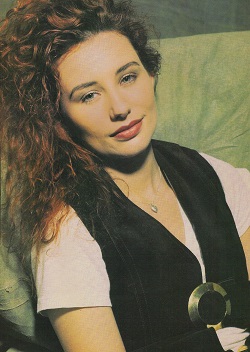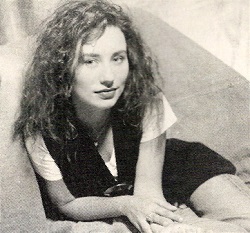|

songs | interviews | photos | tours | boots | press releases | timeline
Time Out (London) (UK)
January 22-29, 1992

-th.jpg)

-th.jpg)
VOTE TORI
Some songwriters wash their dirty linen in public. Tori Amos dries hers there as well. Nick Coleman dodges the rows of hanging knickers to meet the flame-haired, mad-eyed pianist who tickles more than just the ivories.
Tori Amos, cross-legged on the floor of her record company flat, has the whole of her life open in front of her like a map. "I tried for so many years to stir things up in myself; it was getting close to the pierced nipple thing. It was, 'what can I do to get to it'. I mean, some of the things I used to do!" Her palms pop open suddenly on her knees in astonishment. "And now I play the Mean Fiddler and the Borderline and I sing these songs at an acoustic piano, and a part of me goes, 'Just talk about feelings, honey: that's all you need. Put the tar and feathers away. There's power in the simple truth. Talk about what you're feeling!'"
She looks out of the tops of her eyes, reining in her zeal, stabs at the carpet with one finger and fishes honey biscuits out of a crinkly packet with two more. Over-enthusiasm comes before a fall, as well she knows. "But you have to be willing to strip yourself. There is a price, you see. It's a bit embarrassing to do this."
All prodigious children should be slapped upside the head at birth and sent out to get kicked black and blue in the strreet with the normal kids. Think how much more interesting Mozart would have been if he hadn't been schmoozed around the courts of Europe from the age of four like a monkey. The little freak might have developed some width. Same goes for Tori Amos. She could play the piano before she could talk, was writing songs at the age of three and was hustled off to the Peabody Institute at five. No wonder she pores over her life as if it were the navigational chart for Shit Creek. She only ever got invited to other kids' parties on the understanding that she did a twirl at the piano.
"I know contrived, I've done it," she says with emphasis. "And I was dead. I had dead eyes. I let go of the things I believed in as a really young kid and took on what they told me to believe in, and I don't just mean my parents. I had all my beliefs and feelings, all the things that were to do with me, crushed out of me." She says this is her only reason for making her album, "to reclaim part of myself again."
Confessional singer/songwriting (women's division) has trodden a shadeless path over the years since Carol King first ran up the flag with Tapestry in 1971. Shadeless if not shameless. From the earnest early fumblings of Joni Mitchell, through Carly Simon's journey to self-love an the off-couch word-frizz of Dory Previn, to Joan Armatrading and Marianne Faithfull's splendid accounts of womanly ennui at the end of the '70s, the post-adolescent mewi-pack was harnessed by a compulsion to sound grrown-up; to talk openly and frankly in mature, if poetic, reflection on life's twistedness; to confess in the expectation of forgiveness. Only Faithfull ever bothered to sound pissed off.
In the early '90s, however, all good female singer/songwriters are mad-eyed roaring girls, borrowing perhaps from Patti Smith's vocabulary of shamelessness, yet calling their own tunes, acting their age and enjoying themselves immensely. Yes, Tori Amos sounds from time to time like the expulsive kick inside Kate Bush (Bush, of course, has never been interested in confession); and no, Amos lacks the delirious all-around originality of Mary Mrgaret O'Hara. Yet her exhibitionsim is equal to her talent and her talent is immense.
Tori, I said, you seem to have very little difficulty in launching into really quite intense personal conversation with a relative stranger.
"Well," she replied, "You do have a magenta shirt on."
And how is it you manage to sit at a piano in a large auditorium with your legs wide open singing about your orgasm?
"Hush now," she said. "You're making me blush."
But there it is. That's what she does. And if she wasn't doing it, she'd be having a baby with somebody she wanted to have a baby with, maybe, or taking a hike. She'd like to travel some more still, though she's 28 and yet to be taken as seriously as she deserves. "I'm either gonna express myself in the way I want or I'm gonna leave," she says with beady conviction.
Today she's preparing to go back to the Blue Ridge Mountains of Virginia for Christmas. Her flat is an open would of gaping suitcases, half-eaten food, books, sheaves of paper, and festooned knickers drying in little puckered knots. We sit in the middle of it all playing Freudian hop-scotch, trying not to land on the obvious squares. "I suppose I do tend to call the abusers into my life," she says, doggedly, and then qualifies herself. "But apart from the experience that prompted 'Me and a Gun' [a grim song of rape and realisation] there hasn't been any physical abuse, only emotional abuse, and some of it pretty traumatic. You know it's funny how the abuser, the attacker, the baddie never gets addressed as closely as the victim, and I've been thinking about that a lot lately. And about the parts of me that are abusive, those parts of me I've always refused to look at." She leaps up to clatter a teapot in the kitchen. "She's not one of the better heroines in the novel, y'know. She's the one that nobody likes to talk about, that one...," and on she goes ar rare pace.
Time passes. This "one," this part-Tori, is revealed as "the seductrtess - the one who makes Joan Collins look like Mary Poppins." And now she's "really come to be with me. If she's on the loose, Nick, it's very dangerous because her, without me, is like... um, well, there's no hope for her. She's kind of resentful that I gave all her power away..." There's a long pause. "She'd be friends with the Munsters."
Do you ever worry about knowing too much about yourself?
"No!"
Pause.
"Oh dear, I think I answered that too fast."
For all the exhibitionism, the constant analysis, and -- lawks -- the English sin of absolute self-involvement, Amos is terribly likeable. Enthusiasts always are, so long as they observe a basic code of good manners and exhibit at least a passing interest in the world outside the boundaries of their obsession. At least her thing isn't stamp collecting.
"Truly," she says, when asked if she's ever been unpopular, "truly, I was a sweetheart when I was little, like the Honeysuckle Fairy. Sweet. Sweet-pea. But sweet-peas are not popular after second grade. Sweet-pea becomes Nerd really fast."
She smiles pedagogically. "It's tough. 'Specially doing this. I mean just 'cause they're your feelings doesn't mean anybody cares; there are people who can be really honest, and you're yawning." And she explains how the real pleasure of singing and playing to an audience is in "getting to have a different mate every night, and not cheating on any of 'em. When it's good it's soooo good. It's the best love affair, it's better even than... well, though I've had some wonderful love affairs, there's nothing that quite matches it."
Is that because you know that however badly it goes tonight, tomorrow night you're going to have a new lover?
"You mean, no commitment?" She rolls back on her haunches and laughs like a hyena.
Tori Amos plays the Shaw Theatre, Jan 29-30.
photos by Julia Maloof
t o r i p h o r i a
tori amos digital archive
yessaid.com
|